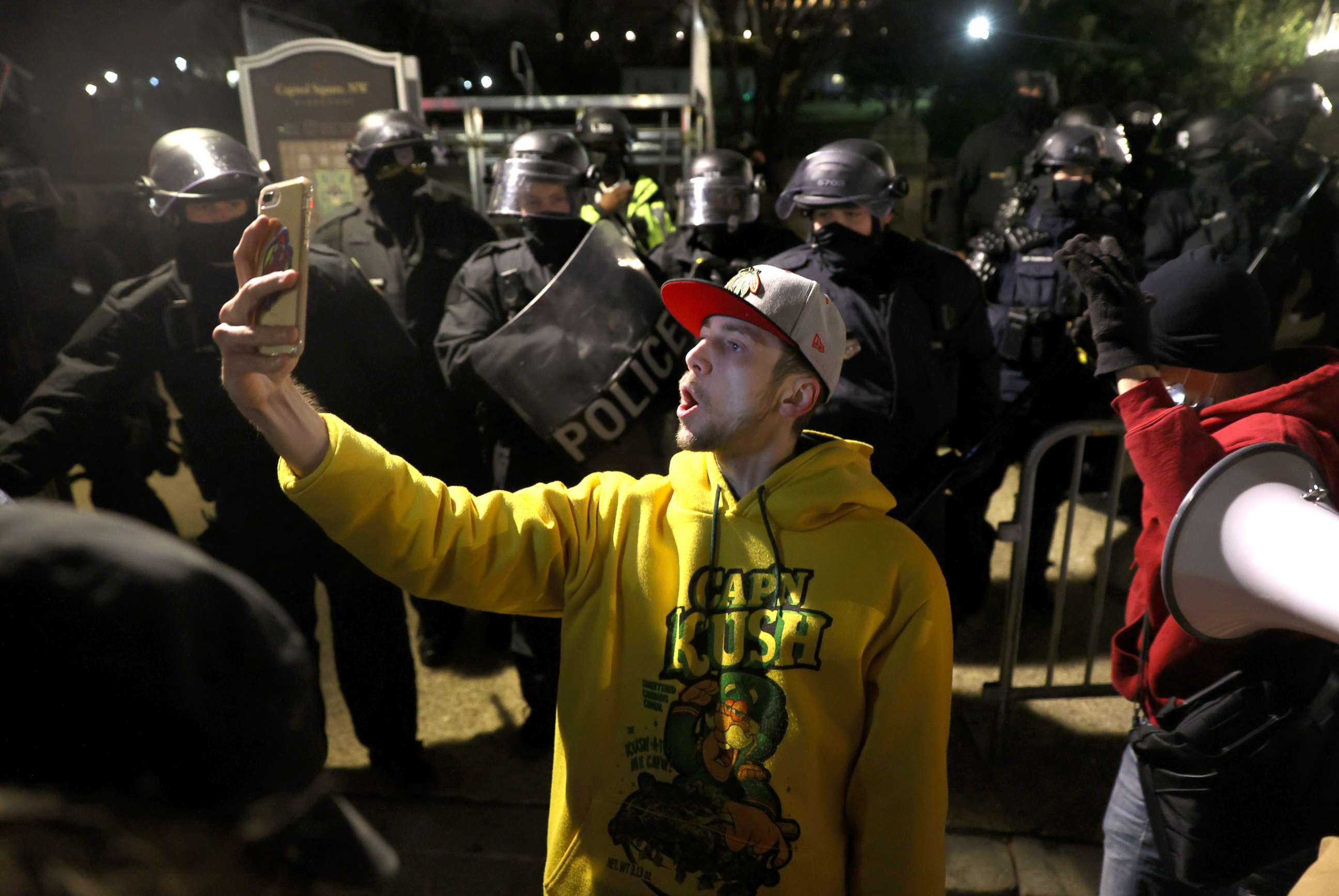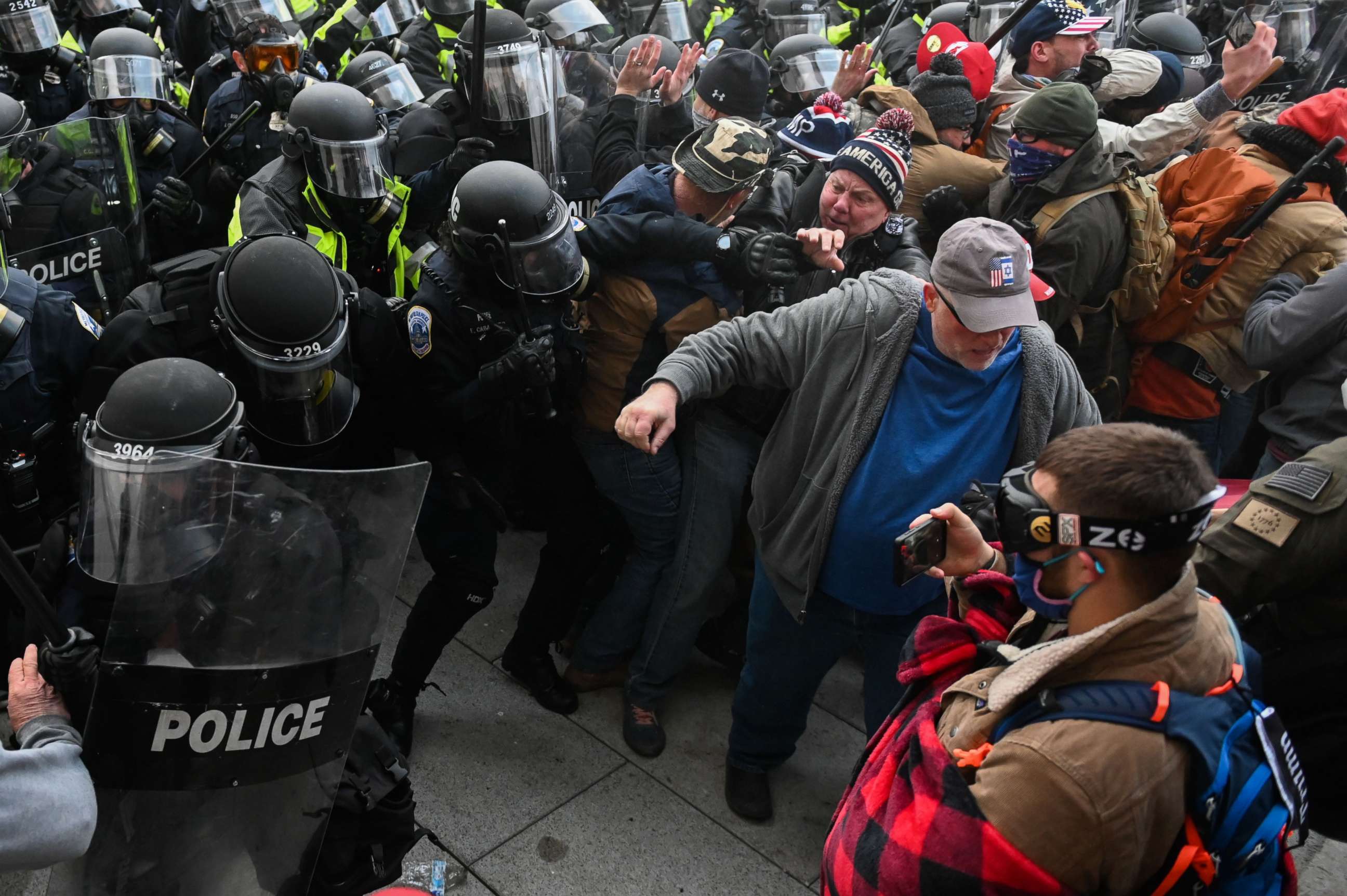Experts say echo chambers from apps like Parler and Gab contributed to attack on Capitol
"Break into Congress and kill the swamp creatures," one user said on Parler.
As Trump loyalists stormed the U.S. Capitol last week, conservative-leaning social media sites like Parler and Gab erupted with talk of revolution and civil war, with trending hashtags like #StormTheCapitol.
Experts tell ABC News that services like Parler -- whose app has now been removed from the leading app stores -- helped create echo chambers for violence and extremist views, then provided a platform for some of the coordination of last week's attack.
And now that the tech industry is moving to crack down on toxic rhetoric, many of those voices have gone in search of alternative platforms.
"We've seen this coming for a while," Ben Decker, founder and CEO of Memetica, a company that provides intelligence and risk advisory services regarding harassment, disinformation, and violent extremism, told ABC News. "The volume of stochastic violence on Parler and similar platforms has always been high; it just took the horrific actions of last week for any tech companies to respond."
"What's most horrifying and concerning about the rise of these new platforms is, we're only one incident away from another Tree of Life shooting," Decker said of the 2018 Pittsburgh synagogue attack in which 11 worshipers were shot dead by a man who authorities say used Gab to promote his racist views.
Within days of Wednesday's attack on the Capitol, Apple over the weekend removed Parler from its App Store and Google removed it from its Android app store, Google Play. Amazon Web Services also cut off service to Parler on Sunday, knocking the entire platform offline because it violated Amazon's terms of service by not doing enough to combat death threats and other risks to public safety, Amazon officials said.
Ahead of the shutdown, Parler founder and CEO John Matze said the app would be offline for an extended period because other cloud hosting companies do not want to work with Parler in light of the moves by Amazon, Google and Apple.
"We will likely be down longer than expected," Matze wrote in his Parler profile. "This is not due to software restrictions -- we have our software and everyone's data ready to go. Rather it's that Amazon's, Google's and Apple's statements to the press about dropping our access has caused most of our other vendors to drop their support for us as well."
In a statement released late Monday, Matze added, "I founded Parler to be a place of open dialogue and discussion where we could work to move past the anger and hostility that seems to be consuming our otherwise civil society" and said that "we do not condone or accept violence on our platform and we never will."

Apple officials, however, said that Parler's failure to moderate its content was a violation of their terms of service.
"We have always supported diverse points of view being represented on the App Store, but there is no place on our platform for threats of violence and illegal activity," Apple said in a statement.
The insurrection last week that left five dead and more than 50 Capitol Police and Metropolitan Police officers injured was "all predictable enough," said Decker, who doesn't believe the online threats of harm and physical violence were taken seriously.
"If the congress confirm ... you break into congress and kill the swamp creatures," said one user on Parler prior to the attack. "Don't forget your guns, this is not supposed to be a good for nothing peaceful protest, it's the beginning of a revolution."
"Were [sic] gonna kill congress," another user responded.
Representatives from Parler and Gab did not respond to ABC News' request for comment.
Unlike Twitter and Facebook, apps like Parler and Gab have minimal usage guidelines and no rules limiting hate speech -- which gave Trump supporters a platform on which to promote and even coordinate the attack on the Capitol, said Diara Townes, an investigative researcher and the community engagement lead at First Draft, a project that fights misinformation and disinformation.
"The intentional lack of content moderation gave free rein for the more extremist users to not just promote but coordinate what happened on Capitol Hill, such as with memes showcasing revolutionary war imagery, naming specific politicians to target, and using hashtags like #FightForTrump and #TheStormIsHere," Townes told ABC News.
"Parler influencers with tens of thousands of followers echoed volatile posts from divisive Trump supporters in the days leading up to Wednesday, and shared screenshots of Trump's tweets about 'a wild day,' advocating for all supporters to show up and 'be ready,'" Townes said.

As police gates were breached and congressional offices were vandalized and ransacked, Trump supporters turned to the apps to encourage others to "fight back" and "hold ground," Townes said.
Later Wednesday, Gab CEO Andrew Torba announced that traffic on Gab was up 40% during the day.
Three days later, Torba said that it was up even more.
"The traffic just keeps growing, hang tight, even more servers on the way today," he wrote on the site Saturday.
Although Parler and Gab saw usage climb after Election Day as Trump supporters circulated unfounded claims that the election had been stolen amid a slew of disproven conspiracy theories, top social media services like Facebook and Twitter imposed stringent measures to stop the spread of misinformation by expanding their conduct policies and updating their moderation of hate speech.
The problem with not moderating content, said First Draft's Townes, is that people who don't recognize incorrect information will keep relying on that content in the app.
Referring to it as an echo chamber, Townes said that "they're being pulled in ... and not being able to relate back to reality."
Experts like Jesse Littlewood, vice president of campaigns at the nonpartisan watchdog group Common Cause, say the lack of moderation on apps like Parler is normalizing hate speech and other forms of "toxic" online content.
"These platforms are where individuals can see their worldview reflected and encouraged, even if in complete opposition to the facts," said Littlewood. "This avoidable tragedy [on Wednesday] was fomented for weeks based on the president and his Republican allies amplifying disinformation about the results of the election."
Creating communities of people with sincerely held beliefs who see nothing but reinforcement for those beliefs can lead to political violence, said Stanford University technical research manager Renée DiResta.
"Many of the people who showed up to the Capitol were carrying signs with phrases common in these spaces," DiResta said.
Townes, who monitors apps like Parler and Gab for First Draft, said it is hard to say if Apple and Google removing the apps earlier would have made a difference in last week's attack, as people would have looked for other ways to connect. But, she said, it could have limited the "amount of exposure less extreme online users had to dangerous conspiracy theories and violent ideologies."
Experts say that users are continuing to seek out other, similar platforms among apps like Discord and the Russia-owned Telegram.
They're "rampant with conspiracy theories, all trying to explain what really happened on Capitol Hill and what they should do next: Wait, give up or act," Townes said.




